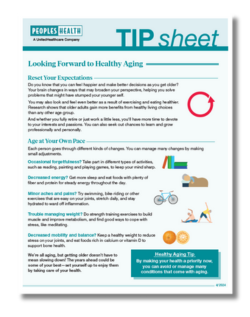Caring for an aging parent while juggling your own responsibilities, which might include work and looking after grandkids, can be physically and emotionally challenging. It may seem impossible to take care of everyone’s varying needs all the time. And if your parent has serious health conditions, that could make things more complicated.
You simply can’t do everything on your own and still have time to take care of yourself. Look to resources and get support where you can. You must recharge your physical and mental reserves to properly care for yourself and others.
Ways to Reduce Stress
Exercise, eat healthy meals and get enough sleep. These are at the center of practicing selfcare, along with regular visits to your doctor.
Take mental health breaks regularly and occasional longer breaks. For short breaks, do at least one thing a day solely for yourself. It could be watching a favorite TV show, reading, meditating or taking a yoga class. Enlist the help of relatives for longer breaks. You deserve a vacation, too.
Practice coping skills to use when situations are beyond your control. Knowing there are things you just can’t change can ease some of the worry, which may help you better care for yourself and your loved one.
Put your tasks in order of importance. If you need to, ask someone to help with housework or other tasks. Even if you do this only once in a while, it will go a long way toward making tasks manageable.
Learn about any long-term health conditions you may have to take care of for your parent. This way, you know what to expect. Also, talk about advance care planning to know your parent’s choices for long-term medical care.
Join a caregiver support group. Having a strong support network is vital to meeting the demands of care. Groups provide a place to express concerns and frustrations, get tips, and fi nd comfort in shared experiences.
Watch for these signs of caregiver burnout:
-
Frustration
-
Losing patience
-
Worry
-
Depression
-
Loneliness








